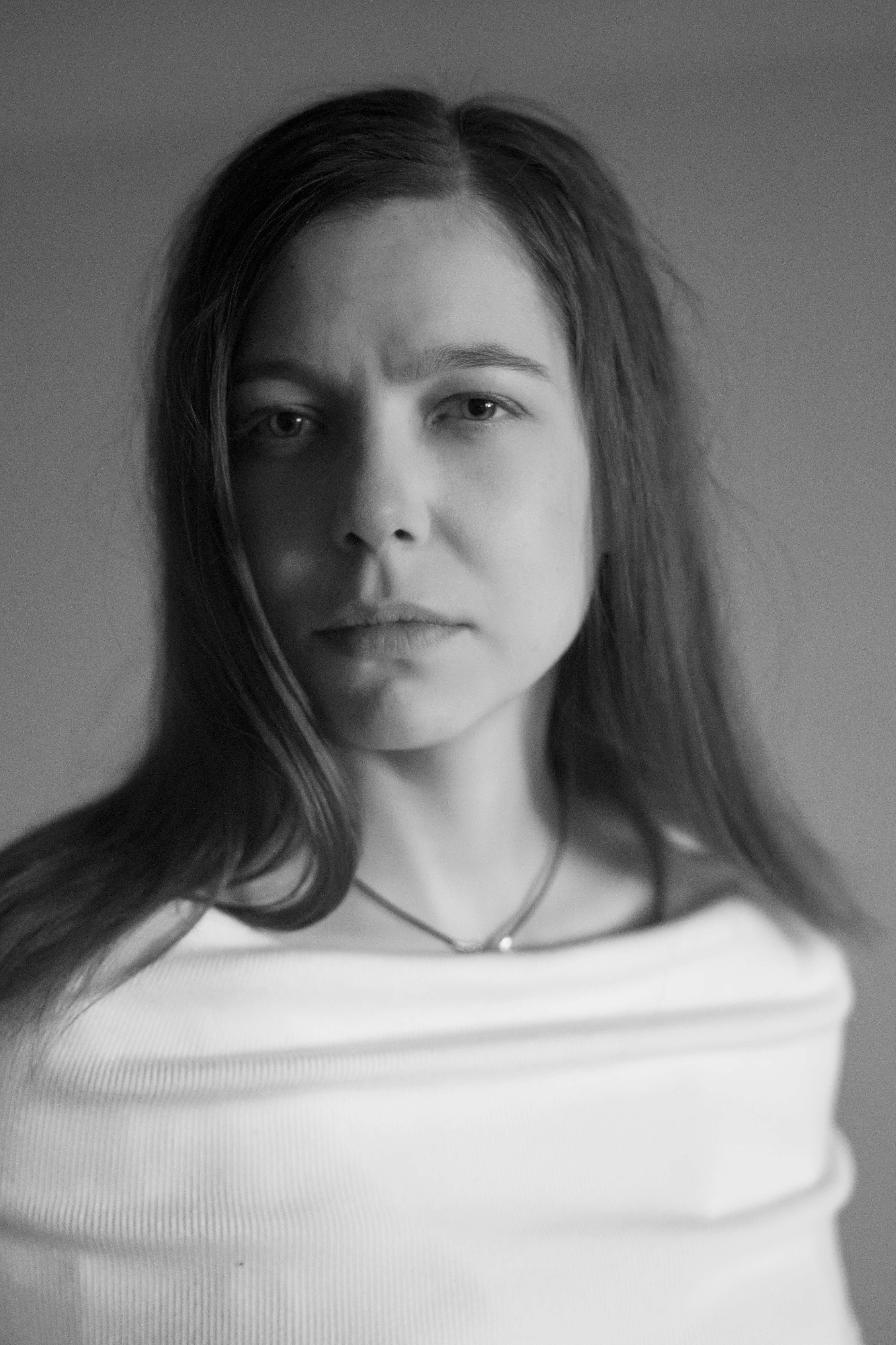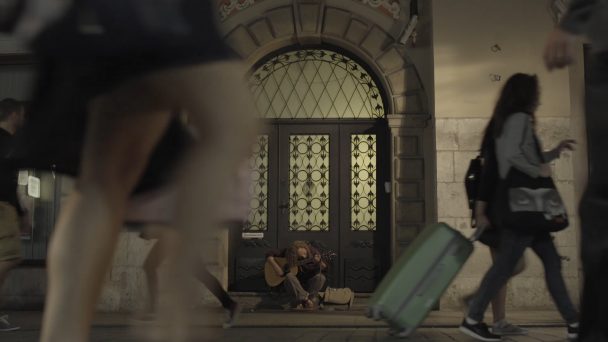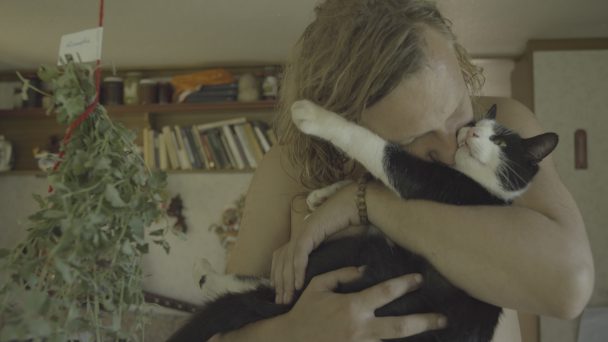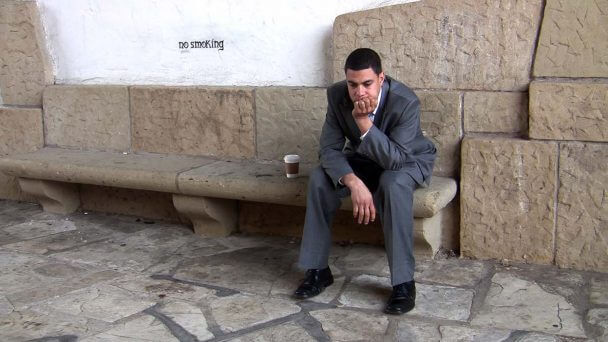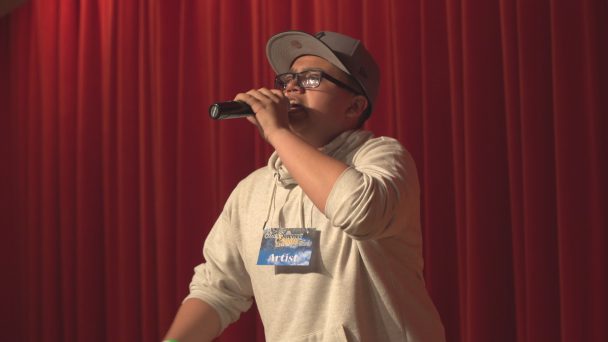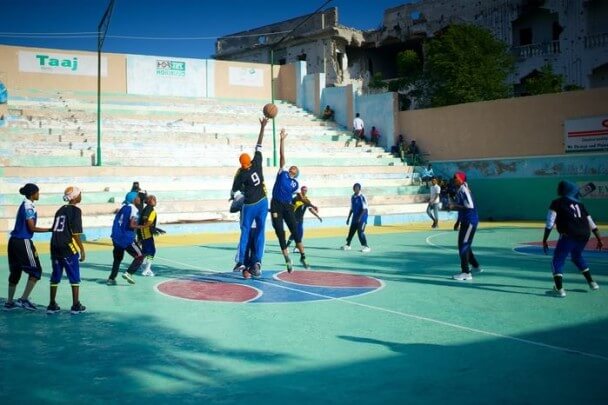Zofia Pregowska: Dozen Days of Filmmakers — Day 11
Chicken & Egg Pictures is celebrating the holiday season and saying farewell to 2020 by featuring a dozen Nest-supported women and gender nonconforming filmmakers. For more Dozen Days of Filmmakers, see here.
“What compels me is the everyday quest of my characters to live a meaningful life.” — Zofia Pregowska
Zofia Pregowska is a documentary filmmaker from Warsaw, Poland. Her directing debut was the short film Invisible, about Mrs. Krystyna—a blind poet who lives in a small flat in Warsaw. Invisible premiered at IDFA and went on to win 19 awards including the Short Documentary Jury Award at the New Orleans International Film Festival in 2014. You can watch the short here.
Zofia graduated from Warsaw Film School for film directing and in 2015, she made her production debut with A Brave Bunch: Uprising Through Children’s Eyes. She operates her own production company, Prego Media, where she works as a director and producer.
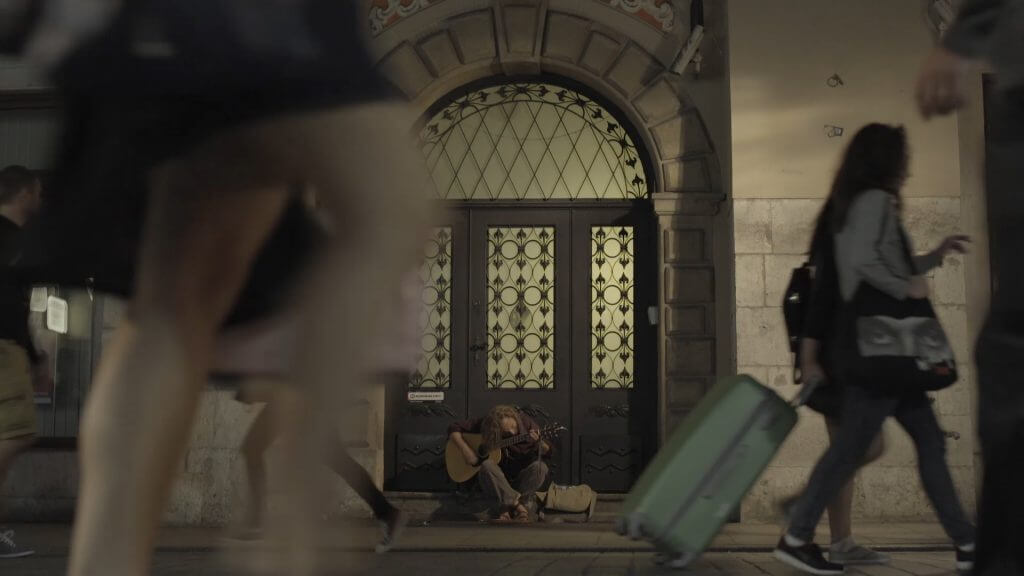
People I Know, which participated in the 2017 (Egg)celerator Lab, is a tragicomedy vérité film about a young married couple living in an old trailer. Prone to nervous breakdowns, Michael is unable to stand consumer society and becomes a street musician. His wife Nathalie is an oncology nurse. One day, Nathalie discovers that she wants to own a house so much that she’s ready to take on a lifelong loan.
“What interests me is how people face everydayness”: Meet Zofia Pregowska, 2017 Accelerator Lab Grantee
Part Three of a series of blog posts from Chicken & Egg Pictures’ 2017 Accelerator Lab grantees. This post is an interview with Zofia Pregowska, Chicken & Egg 2017 Accelerator Lab Participant and director of People I Know.
Your documentary debut and short film, “Invisible,” is a portrait of Krystyna, an elderly, almost blind poet, as she prepares for a performance. It was an official selection at more than twenty five film festivals. Why do you think such a specific story has resonated with so many people?
Krystyna is an incredibly inspiring person. Though she is closed in her little apartment, she is able to wander through worlds in her imagination. At the same time, she is extremely disciplined and hardworking. She has taught me that we ourselves give value to what we do. The film is about the power of mind and imagination–but not daydreaming. Krystyna is not waiting to be saved and does not dream about the impossible. She takes her own life in her own hands, accepting it the way it is. This doesn’t mean that she accepts that she has lost her sight and hearing–but she never allows herself to be held back by her age or her disability. And she has a great sense of humor. She faces the challenges facing each of us, the gray everydayness, and she conquers them with her humor, love for life, and poetry.
A beautiful thing about “Invisible” is how quiet the audience feels, like we’re seeing something secret, something special. Your work-in-progress, “People I Know,” tells the story of Nathalie and Michael, a young married couple living in a trailer, he, a street musician, she, an oncology nurse. What compels you, as a filmmaker, to tell such intimate stories?
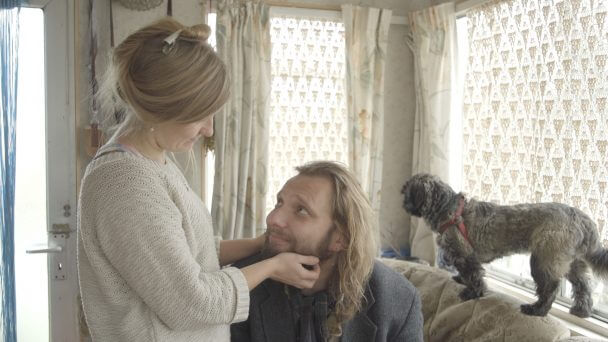
What compels me is the everyday quest of my characters to live a meaningful life. 90-year-old Krystyna has found her path; Michael and Nathalie, in their thirties, are at a crossroads looking for their way. What interests me is how people face everydayness. And filming people in their home is like being backstage in the theater of everyday life. What happens outside the home is a theater of social roles we play, for better or for worse. And hopefully it is compelling to the audience because there is nothing more universal than everyday life struggles. They may take different shapes in different places, but marriage, career choices, illness, aging, everyday fears and hopes are things we all can easily relate to and [at the] same time we easily miss them in everyday life. So what I try to do is take a close look at that common reality which is often invisible, to remind myself how extraordinary, ridiculously funny, and deeply tragic it is.
How have you grown as a filmmaker since “Invisible” (it being your graduate film)? How have you been adjusting to and preparing for your first feature-length documentary?
The popularity of “Invisible” gave me a lot as I had the opportunity to travel to many international film festivals which was both an amazing inspiration and [at the] same time a reality check. Therefore, I had the opportunity to meet a great number of wonderful filmmakers, short films debutants like me as well as established ones who could share their experience. Also, my industry knowledge was practically nonexistent before that, so in that sense it was a big step for me. I also had a chance to take part in the IDFA Academy and Uniondocs Summer Intensive in New York which was a great, enriching experience. Then, I also discovered Chicken and Egg. It would never have been possible without the Polish Film Institute’s support which made me able to travel. In the meantime I produced the children’s historical documentary short “A Brave Bunch,” which was also a great lesson for me as it was made in a completely different style of work and included child actors and around 25 crew members.
So in that [sense] I evolved a lot, but [at the] same time it doesn’t mean making your next film is any easier than the last one. I doubt you can prepare for this kind of documentary, as you have to be open to the unexpected. It’s more like an experience of falling through the ice. Before “People I Know” I was preparing for a completely different film, the kind where you have lots more control. And then I received the call from Michael to visit him and his wife in a trailer. Once we went there with my cinematographer Tom Stankiewicz, we forgot about all other plans and we kept shooting for the last two years.
“Invisible” captures Krystyna and her poetry using a fly-on-the-wall fashion. Will “People I Know” operate similarly stylistically?
Yes, “People I Know” will be stylistically similar in terms of creating the “feeling of being there.” I like to leave the audience alone with my characters.
Zofia Pregowska is a documentary filmmaker from Warsaw, Poland. She graduated from Warsaw Film School for film directing and her documentary debut, Invisible, premiered at IDFA and went on to win 19 awards including the Short Documentary Jury Award at the New Orleans International Film Festival in 2014. In 2015, she made her production debut with A Brave Bunch: Uprising Through Children’s Eyes. She operates her own production company, Prego Media – Handmade Films, where she works as a director and producer.
Post by Morgan Lee Hulquist, 2017 Summer Communications Intern.
Chicken & Egg Accelerator Lab Live Pitch at Sheffield Doc/Fest
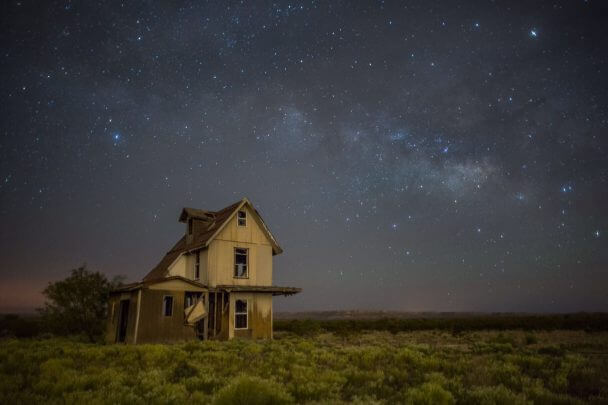
Join us for our first ever LIVE CHICK-PITCH at the 2017 Sheffield Doc/Fest.
Our focus: to showcase, celebrate, and introduce you to the work, vision, and promise of 10 compelling projects helmed by emerging women directors from around the globe—each one a member of our 2017 CHICKEN & EGG PICTURES Accelerator Lab, hailing from Bangladesh, China, Somalia, Mexico, Poland, and across the US.
The Live Pitch will take place on Sunday, June 11, 12:00 – 14:00 pm at the Sheffield ITV Town Hall Reception Room B.
Moderated by award-winning filmmaker Judith Helfand, Chicken & Egg Pictures’ Co-Founder and Senior Creative Consultant.
THE PROJECTS
- Born in China by Nanfu Wang & Lynn Zhang (China)
- The Guardian of Memory by Marcela Arteaga (Mexico)
- Kids Can Spit by Chelsi Bullard (US)
- Lights, Camera, Uganda by Cathryne Czubek & Hugo Perez (US)
- People I Know by Zofia Pregowska (Poland)
- Rajada Dalka/Nation’s Hope by Hana Mire (Somalia)
- The Rashomon Effect by Lyric R. Cabral (US)
- Surf Girls of Cox’s Bazar by Elizabeth D. Costa (Bangladesh)
- The Surrender of Waymond Hall by Jane Greenberg, (US)
- Unaccompanied Children by Alexandra Codina (US)
Find out more about the 2017 Accelerator Lab.
If you would like to attend let us know by emailing Sabine Fayoux, Program Coordinator, at sabine@chickeneggpics.org.
If you can’t join us at the Live Pitch please consider meeting with the filmmakers individually or in small group meetings during the festival. To coordinate a meeting, please contact our European representative and Sheffield Doc/Fest liaison Tereza Šimíková at simikova.tereza@gmail.com.
The Chicken & Egg Pictures Accelerator Lab is a year-long program that brings together 10 nonfiction projects directed by women from around the world who are making their first or second film. The program provides them with a major grant of $35,000 USD and intensive mentorship that strives to balance creative storytelling and core producing skills with practical models for building sustainability, community, and relationships in the nonfiction marketplace. The 2017 Sheffield Doc/Fest marks the program’s second of three retreats, this one built around utilizing and leveraging all that the Sheffield Doc/Fest’s Meet Market and Industry Convenings have to offer.
Chicken & Egg Pictures Announces 2017 Accelerator Lab Finalists
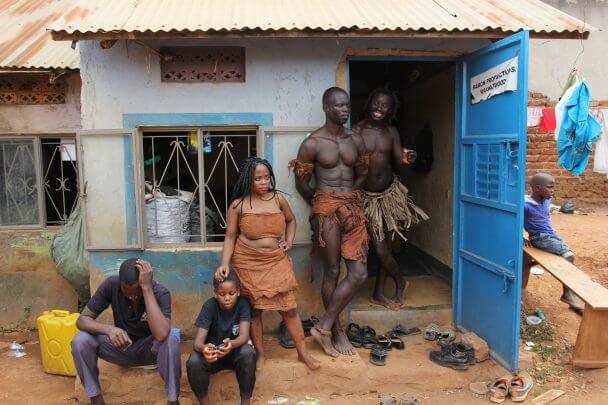
We’re proud to announce our newest cohort of Accelerator Lab participants. Congratulations to all!
The Surrender of Waymond Hall
Directed by Jane Greenberg, US
The Surrender of Waymond Hall tells the redemption story of a young black fugitive on the run for the violent crime he committed a decade ago. With extraordinary access, the film follows Way as he wrestles with the excruciating decision to turn himself in, faces the watershed moment of surrender, and navigates a criminal justice system accused of discriminating against people just like him. His story exposes flaws in our societal institutions and in human nature, unfolding against a backdrop of national debates over the divisive racial impact of our criminal justice policies and the remarkable push to reform them.
The Guardian of Memory
Directed by Marcela Arteaga, MEXICO
The Juarez Valley, a region once known for cotton production, is now nothing more than burned down houses, empty towns, and memories. Carlos Spector, an immigration lawyer born in El Paso, TX, fights to obtain political asylum for Mexicans fleeing from violence. This is the story of Mexican men, women, and children seeking a respite from their tragedies by heading to their neighboring country, the U.S. It is also a story about the kindness and hope that still exists in people who have gone through hell, and about Carlos Spector’s tireless efforts to keep memory alive.
Kids Can Spit
Directed by Chelsi Bullard, US
The feature documentary Kids Can Spit follows three New York City teenagers over the school year as they gear up to compete against one another at the Science Genius B.A.T.T.L.E.S. (Bringing Attention to Transforming, Teaching, and Learning Science), a science-themed rap competition. The competition’s creator, Professor Chris Emdin, believes hip-hop is uniquely suited to teach science. For students Mannix, Genesis, and Jason, this battle is a way to beat society’s odds while carving their identities and finding their voices. Pressure mounts on Chris to prove his innovative curriculum does what traditional science classes have failed to do: engage disenfranchised Black and Latinx youth to become proficient in science through rap.
The Surf Girls of Cox’s Bazar
Directed by Elizabeth D. Costa, BANGLADESH
Jahanara, Rifa, and Ayesha live in one of the poorest slums near the beaches of Cox’s Bazar in Bangladesh. From a young age, the girls are sent to work in order to supplement the family income, and social norms dictate that they will be married when they turn 14 or 15 years old. The girls discover a newfound freedom in a surf club and find out they have the skills and talent to win competitions. This spurs their ambitions and they dream of becoming the first international female surfers of Bangladesh.
The Rashomon Effect
Directed by Lyric R. Cabral, US
What happened when unarmed Black teen Michael Brown was fatally shot by White police officer Darren Wilson?
Born in China
Directed by Nanfu Wang and Lynn Zhang, CHINA
How much control does a person have over their own life? In China, state control begins before a child is even born.
Unaccompanied Children
Directed by Alexandra Codina, US
Unaccompanied Children reveals America’s invisible refugee crisis through the eyes of one family that defies a broken system with their unwavering resilience. Deep in the everyday life of the loving and optimistic Gonzalez family, the horrific violence of gang-ridden Honduras and the encroaching threat of draconian US enforcement are almost forgotten. The film goes beyond the traditional immigration narrative to a nuanced, intimate story which implicates us all in how we care for the most vulnerable.
Lights Camera Uganda [working title]
Directed by Cathryne Czubek and Hugo Perez, US
Against all odds, former bricklayer and teacher Isaac Nabwana has turned his small home in the slums of Uganda’s capital city into the Wakaliwood action movie studio. After 10 years and 40+ films, Wakaliwood has become an overnight international media sensation, inspiring others around the world to follow in his footsteps. When New York film nerd Alan Hofmanis shows up on his doorstep one day, everything is bound to change.
Rajada Dalka/Nation’s Hope
Directed by Hana Mire, SOMALIA
Somalia’s newly revived Women’s Basketball team seeks to inspire their nation as they overcome immense challenges in their first season since the outbreak of war in 1991. To continue to play the game they love, the team must defy both religious leaders and violent militant groups that believe that their sporting ambitions are un-Islamic. They must also battle against the sexism faced by women in sports across the world.
People I Know
Directed by Zofia Pregowska, POLAND
People I Know is a tragicomedy vérité about a young married couple living in an old trailer. Prone to nervous breakdowns, Michael is unable to stand consumer society and becomes a street musician. His wife Nathalie is an oncology nurse. One day, Nathalie discovers that she wants to own a house so much that she’s ready to take on a lifelong loan.
Note: Since the time of the original publication of this post, some film descriptions have been edited upon filmmakers’ requests.

